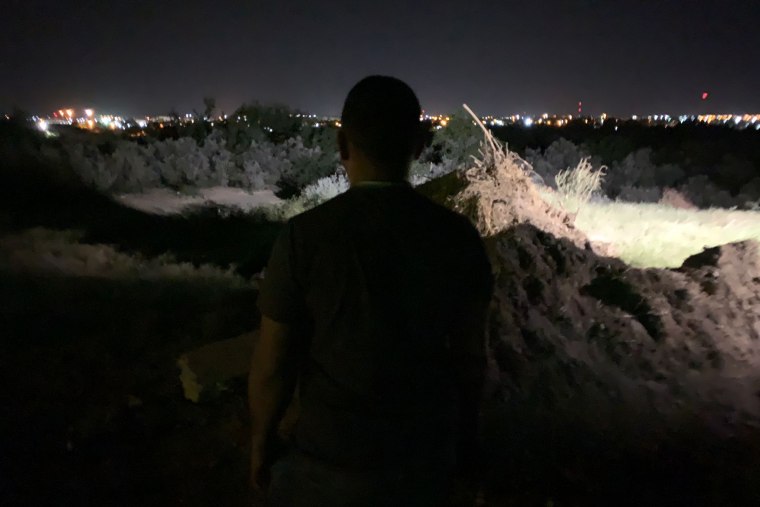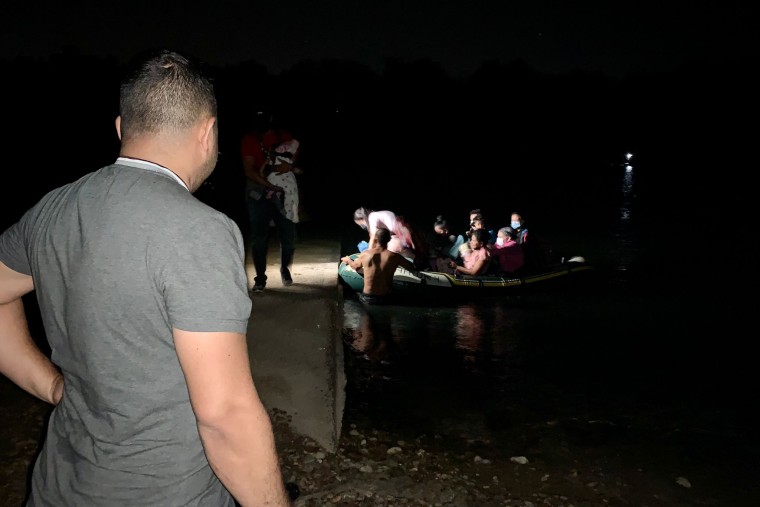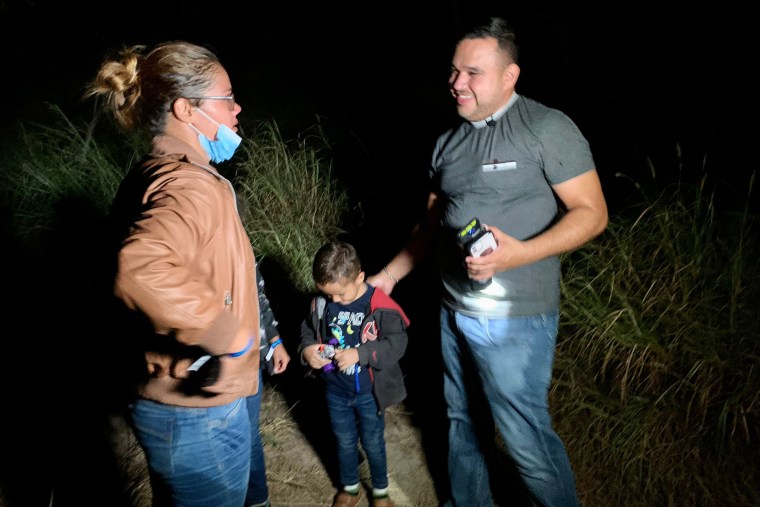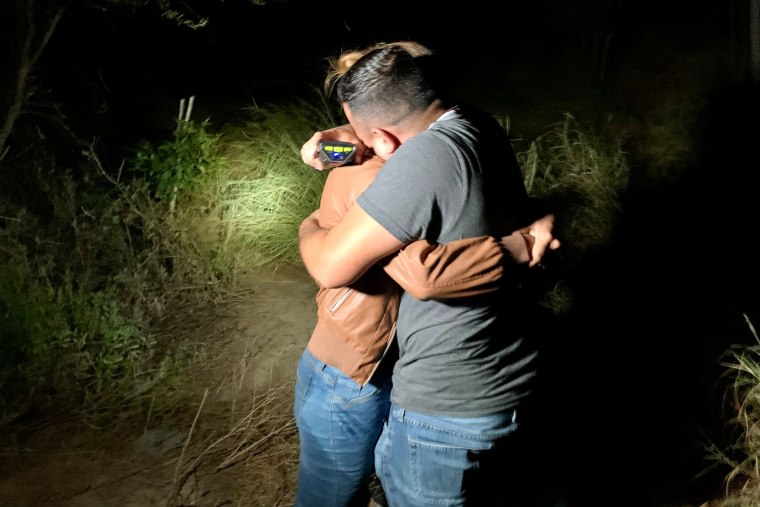MCALLEN, Texas — The man gets out of the car, stretches his legs and changes his flip-flops for sneakers. He's driven south for hours, toward the border, and he's surprised by the gentle breeze that soothes the Texas heat; maybe it's a good omen.
Edín Galeano, a 36-year-old immigrant from Honduras, wants to meet his family tonight — right after they cross the border from Mexico and get across the river.
He has not given his partner a hug for almost six years. He left his 6-year-old daughter when she a year old, and his 5-year-old son hadn't been born yet; they only know each other from video calls. The mother and children have tried to cross the border twice but were sent back, first under former President Donald Trump and again just a few weeks ago.
Desperate and in debt to pay for the crossings, Galeano said he saw no alternative but to travel to the border himself — and avoid at all costs the U.S. Border Patrol finding his family, prosecuting them and expelling them without evaluating asylum options, as has been the case for many since the pandemic started.
"I ask a lot of parents this question: What are they willing to do for their children? What are you willing to do for your family? This is one of the risks that I am taking as a responsible parent — the most important thing in my life is my family," Galeano told Noticias Telemundo Investiga. "I feel that nothing matters to me — after five years without them."
10:30 p.m.: 'I think they'll come through here'
Galeano, who has been dealing with a slow asylum-application process since 2016, is aware of the risks for his family.
Near the border, at night, the highways and roads fill with Border Patrol vans, local police cars, Texas state troopers and Army reservists. From time to time, a helicopter appears in the starry sky or a large spotlight breaks the blackness of the vegetation. Galeano, who is holding on to his work permit in the United States, feels that tonight he has to be invisible.

In Texas, many river-facing lands are privately owned, and in recent months the state has tried to increase penalties for migrants who cross those fields and for people who transport them on state highways.
Every few seconds, Galeano looks down at his cellphone. His partner wears a phone hidden in her clothes and sends him the location in real time on WhatsApp.
“We are on this side, and I think they will come out here,” Galeano said.
The two points are seen getting closer and closer to each other on the map, but in the middle is the Rio Grande — a painful symbol of the border that separates so many dreams and journeys.
11:55 p.m.: 'Those could be my children'
On the way to the river, he passes migrant families who have just touched U.S. soil and are looking for Border Patrol agents to turn themselves in, requesting asylum. There are mothers carrying their babies on their backs, fathers holding their little ones' hands and young faces, hardly even teenagers, with muddy boots.
Galeano checks each of their faces. They say good night to one other, and as they walk away, Galeano thinks out loud: "These are people carrying dreams they want to fulfill. I think one of them could be my children, right?"
A scar reminds him of why he left Honduras: He was shot while working as a driver for a political candidate during a campaign, he said, and he asked for asylum in the U.S. He couldn't leave immediately, as he had to raise the money for the costly escape. Now, as he tries to get his family out, the payments have been adding up, the debts mounting.
With the pandemic, the United States has applied Title 42 at the border. It considers the arrival of migrants a risk to public health and has already been responsible for more than 800,000 expulsions so far this fiscal year.
Most are returned to Mexican border cities where they are at risk: Human Rights First has recorded at least 6,356 kidnappings, sexual assaults and other violent attacks, according to a new report.
The mom and children’s first trip cost about $10,000; the second one, $9,000 more, but after crossing, they were expelled to Ciudad Juárez, in Mexico. Galeano had to make one more payment of $2,000 earlier in the day in order for them to cross again.
12:30 a.m.: 'They are not on that raft, either'
Upon reaching the river, Galeano turns off the flashlight, and in front of him he sees only darkness. He senses what is happening on the other side, in Mexico: He can hear migrants whispering before crossing. It's an almost undetectable bustle, only broken by a child's cry or the orders from a coyote, or smuggler, in a grave voice and the noise of rafts filling with air.
With the flashlight, Galeano shines the first rafts that cross the river, searching the faces for his partner and children, but no. He looks back at the cellphone, at the location.
“They are already in the river. It is ready to cross,” he said.
He helps some children get out of a wobbly raft. He's impressed by a month-old baby well attached to his father’s chest. A woman falls on the rocks. A raft arrives, and another, and another.

He can’t find the faces he wants to see so much. He wonders if he's in the right place, if they lost the cellphone signal or it was stolen. His idea of going down to the border was full of good intentions, but, now, in this corner of the river, avoiding mosquitoes and ants, it also seems very ambitious in such a large, remote, dark border.
"There’s one more group missing — one more and that’s it," a coyote tells Galeano as he realizes he's looking for someone.
Galeano sits on a rock. He fears his children won't recognize him, but he corrects himself, remembering the video calls.
Then he smiles, remembering a promise he made to his daughter: If she didn't remove her mask throughout her trip, they would eat ice cream together in America. Mom confirmed — she didn't take it off.
The last raft of the night arrives, according to the coyote. A woman carries her belongings compressed in a grocery bag. A man carries a sleeping girl of about 6 in his arms.
“No,” Galeano said curtly. They are not in that one either.
12:50 a.m.: 'There is my precious girl!'
He swallows hard, goes back to the phone; they don’t answer his call. Suddenly, there's the high-pitched sound from the Whatsapp message.
“She says she's already crossed!” Galeano said.
The location is higher up the river. Galeano crosses the mountain in the dark as fast as he can, moving through the vegetation as branches crackle; he almost steps on a scorpion. He comes to a bend in the road — and bumps into them.

"There is my precious girl. ... So cute, my boy, precious, damn," his voice trembled between tears and laughter as he embraced his family.
To his partner, when she hugs her, he whispers in her ear: “Tranquila, OK, tranquila,” telling her in Spanish she can now calm down.
While Galeano repeated, “My baby is so big; my baby is big,” his children said this is their “daddy.” They have recognized him. They have met again — they succeeded.
1:31 a.m.: Burgers at the drive-thru
They return to the car, in total silence, with the flashlight off.
For dozens of miles, Galeano drives very slowly, with the utmost caution; any small mistake would attract the attention of the traffic patrols that populate the border roads.
Later on, they feel more confident and stop to eat something at a drive-thru that has an American flag in front and is open 24 hours a day. They order Coke, lemonade, hamburgers and salad. At 3:30 a.m., they are celebrating that they are together.
The day after
With the sunlight, the family starts their day, buying clothes, catching up, the four of them in a motel room. They visit an immigration attorney, Jorge de la Fuente, at a border community organization, La Unión del Pueblo Entero.
After the adrenaline of the night before, now it's all about patience. They will try to add the rest of the family to Galeano's asylum case, but it's a slow process.
It's a risk as they travel north, through riskier checkpoints, since the asylum process for the mother and the children is not yet in place. They could be expelled again.
The boy plays with a toy dinosaur, while the older daughter tries to understand the adults' conversation. The parents listen tensely to their attorney, who knows he is not telling them what they would most like to hear. The couple thank him.
They leave the office looking pensive, holding hands with their children. It's not clear who's holding on for strength.
A version of this story was first published in Noticias Telemundo.
Follow NBC Latino on Facebook, Twitter and Instagram.
